
Late last month, Majestic presented a new Keyword Research Tool: The Majestic Keyword Generator. There has been lots of feedback and many questions from users like you. This post explains how the Keyword Generator differs from other keyword tools. I’ll explain why the keyword data produced by this new SEO Tool can push your content marketing efforts beyond traditional keyword suggestions and related keywords.
A new approach to Keyword Analysis
The recent launch of Link Context introduced new data and enhanced SEO activities. Link building and backlink analyses have been streamlined and are now straightforward tasks.
Link Context helps distinguish between good, bad and GREAT links. Majestic achieve this result by extracting the content surroundings every link on a page: you can check out up to 200 extra characters around any anchor text. This contextualisation of the link provides many useful insights.
Without going into the details of this new metric, it’s sufficient to keep in mind that we now have access to essential data from content surrounding every backlink. Think about that for a moment: the concepts derived from the content around billions of links.
Anchor text and text near a backlink convey intent
What does that mean? Well, for example, the author of a blog post or article uses links to enrich a story. Technical writers use links to deliver explanations and direct users to additional resources, making the content easier to understand. SEO copy makes use of keyword-rich anchor text.
As you can see, this data is a cornucopia of information. Majestic have applied data science with advanced semantic technology to produce keyword suggestions – the main focus of this post.
The Keyword Generator by Majestic provides meaningful insights to improve your writing and future-proof your organic traffic. You can use this keyword research in your search advertising activities. Let’s understand why Keyword Generator Data is different and see how you can use it to improve your SEO.
Keyword suggestions and related keywords
Every SEO has performed countless analyses to:
- find competitor keywords;
- identify high volume keywords;
- evaluate keyword difficulty;
- source keyword suggestions.
Sooner than later, you find yourself running around in circles, using the same keyword tools your competitors use. They generate keywords you are both going to use to compete for SERP real estate.
Wouldn’t it be great if you could find new keywords that break free from this vicious loop?
In 2017 Google claimed that 15 per cent of search engine queries are brand-new.
People search in new ways every day using unknown patterns, which is why search marketing is such a challenge.
Find new keywords for fresh content marketing strategies.
Language changes to reflect how people communicate. We create words and use colourful expressions with our audience in a constant attempt to engage with the readership.
People consume content and get accustomed to these new words and expressions: they like to appear up-to-date and trendy. What we are describing is a circle of communications:
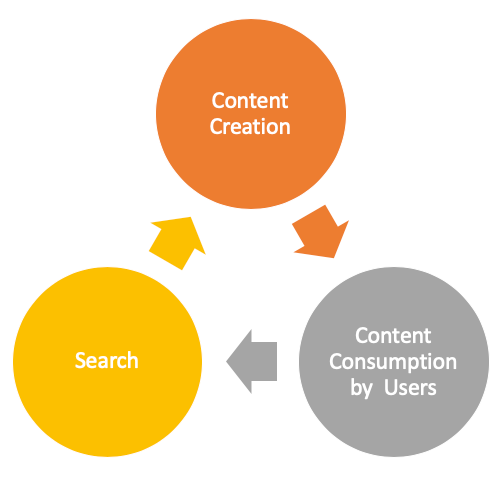
Keyword Generator suggests keywords based on what people write.
There’s more to this statement than meets the eye. At the beginning of this article, I mentioned data science and semantic technology to find keywords and produce keyword suggestions – let’s take a closer look, to understand the nature of the process without delving into the technical details.
With Keyword Generator research starts with a Seed Website. For example, you can begin your search for keyword ideas using your website or those of your competitors.

You now go on to step 2 and choose to Add Related Sites. They help Majestic understand and elaborate a more accurate list of keywords. Unless your site is enormous, this step is very useful and will increase accuracy. Remember, your keyword suggestions are based on the analysis of the Link Context data. More significant sites tend to have more backlinks and will, therefore, offer more data to process. Which is why I strongly suggest using related sites before moving on to the third and last step – getting the keywords:
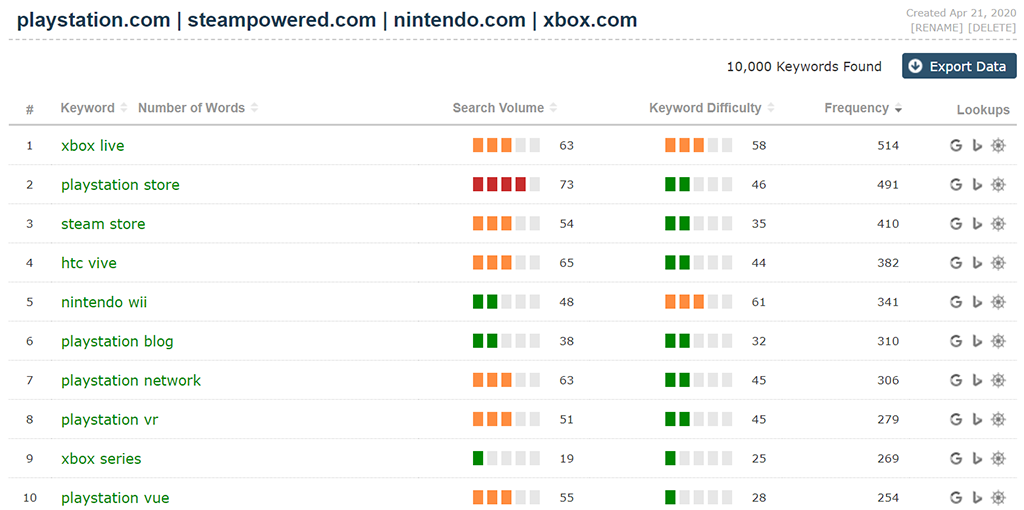
Clicking on a keyword opens a new window expanding results:
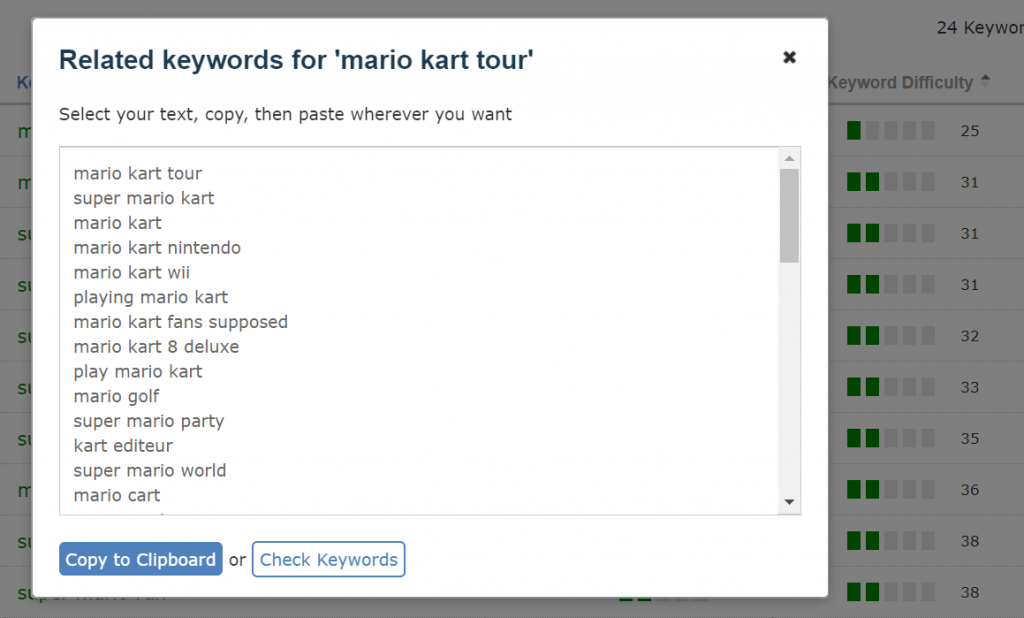
So far, I’ve explained how the keyword data has been extracted. Before moving on to show you how this data can be put to good use, there’s a caveat: You’ll notice, from time to time, some irrelevant suggestions in your list. This is even more so if the seed website (and related ones) are all rather small. This is a work in progress kind of situation so you can expect things to change as Majestic harvests more Link Context data over time.
How to use this keyword data
Now let’s look at how you can gain a competitive advantage and increase your organic traffic with this keyword research tool. So far, I have described how the data is collected. We’ve also explained how the tool generates keywords. Remember, the Majestic Keyword Generator uses website data, not user queries. Keyword ideas are divided into primary keywords and 2nd tier keyword suggestions (see previous screenshot).
This data allows you to create a shortlist of the most important terms and verify their presence in your strategy. You are likely to find exciting keyword opportunities that will increase your online visibility attracting quality organic traffic.
In my experience, this kind of research is essential to acquire and maintain a competitive advantage.
Here’s a creative way of putting these new terms to the test.
Create a new campaign in your Search Advertising accounts on Google or Bing.
Paid search is fast.
Within a matter of days, you’ll have accurate performance data to analyse. Not only will the campaigns inform on how the new keywords fit into your existing strategy, but they will also produce more search terms users have used to trigger your ads – a win-win situation!
With this new and proven data, you are ready to revisit your SEO strategy and deploy a new generation of keywords to your website.
Keywords you cannot find elsewhere
As an SEO who has been around for quite some time, I’ve worked in just about every market segment you can think about. In some cases it is impossible to get your hands on reliable keyword suggestions: I can think of a number of times I turned to the Google Keyword Planner and found nothing. This is where The Majestic Keyword Generator comes to the rescue. An example? How about Link Building!
Keyword Research for the query ‘Link Building’
If I had one euro for the number of times I saw this message… well I’d have a nice chunk of cash!
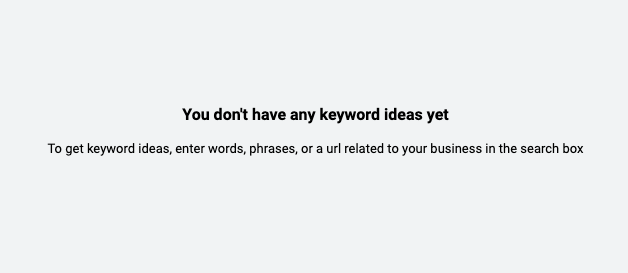
And this is the message from Google ads keyword planner when I searched for Link building – read:
Sorry Sir, we are not disclosing any information on searches related to link building. Please try again and better luck next time
So I gave Keyword Generator a go – here’s how I performed the research:
- Opened the Keyword Generator Tool page
- Choose a site seed: in this case, I choose a popular backlink checker and four related sites.
- Clicked Get Keywords and waited for Majestic to crunch the numbers.
In a matter of seconds Majestic returned a list of suggested keywords for me to review:
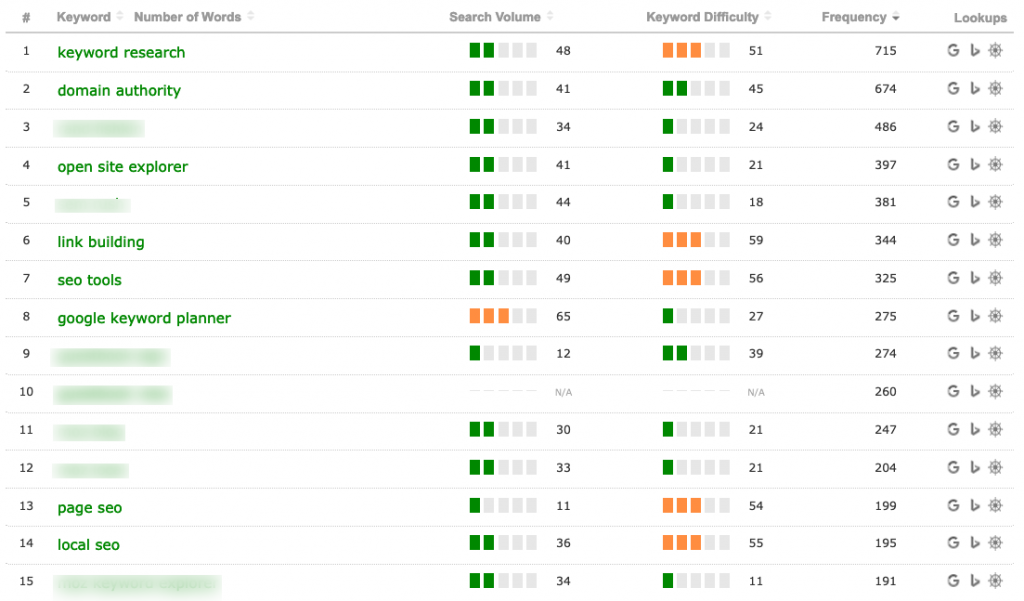
The tool returned exactly what I was looking for: the keyword “Link Building” – I clicked through and it produces a list of related (2nd tier) keywords on topic:
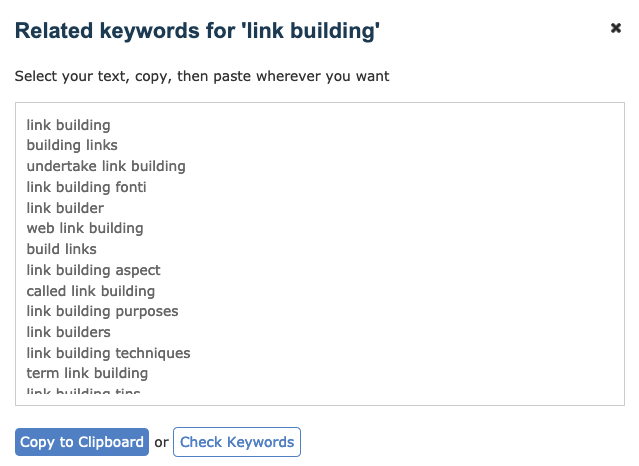
Now I can copy the list, clean and analyse to evaluate their difficulty. In fact, Majestic can also Check Keyword Competiton. Steve Fitzpatrick explained this in detail here.
In Summary
- The Majestic Keyword Generator sources semantically similar keywords and phrases, based on website content.
- The tool provides keyword suggestions for every market segment.
- You can evaluate the SEO efforts needed to rank with Keyword Checker.
We’re moving our first steps and discovering new ways to use this tool. Share your insights, contact me or leave a comment. Sharing is caring.
Keyword Generator is available on all subscription plans, starting at $49.99 a month.
- Is metadata important in SEO? - October 30, 2023
- A Simplified Approach to Content Creation using NLP - May 11, 2023
- The unknown side of search: when words become numbers - November 18, 2020







Hi, thanks for this article. This sounds quite interesting for me.
Does this Keyword Generator also work with other languages than just english ?
May 20, 2020 at 1:08 pmHello Friedrich, Thank you for your question. Yes it works in other languages as well. As I mentioned in the post, accuracy, and variety will improve with bigger sites (where there is more backlink data). Again I stress that we are moving our first steps so if you catch anything strange then please flag it and support staff will take it from there. Gald you find the tool interesting 🙂
May 20, 2020 at 1:30 pm